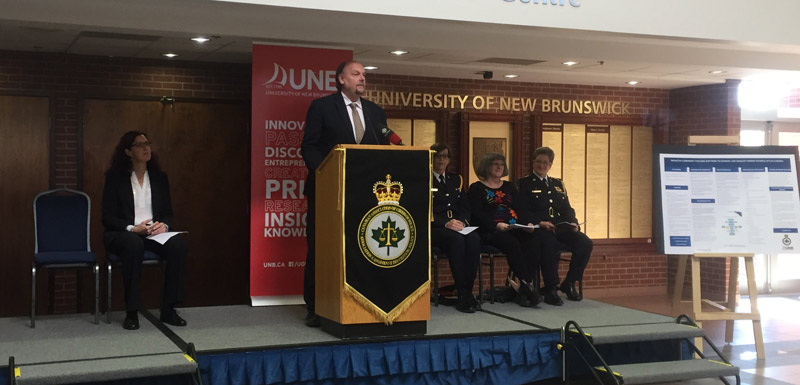National Framework for Responding to Intimate Partner Violence released at UNB
Author: Communications
Posted on Nov 14, 2016
Category: UNB Saint John , UNB Fredericton

The Canadian Association of Chiefs of Police (CACP) today released a comprehensive framework for police forces on dealing with intimate partner violence.
“A unified police response to intimate partner violence in Canada is critical,” says Chief Kimberley Greenwood of the Barrie Police Service and co-chair of the committee that brought forward the framework.
“Over the last decade, we have seen a significant change in how police services respond. In our continued focus on intimate partner violence, we recognize safe communities begin with safe, interpersonal non-violent relationships,” she says.
The National Framework on Collaborative Police Action on Intimate Partner Violence was announced at a news conference today at the University of New Brunswick. The framework was developed from research led by Dr. Carmen Gill of the Canadian Observatory on the Justice System’s Response to Family Violence at UNB.
The framework – prepared under the guidance of Dr. Gill and subject matter experts from across Canada over the past two years – is research and evidence based. It will be rolled out across Canada as a guide to police leaders and community stakeholders to better inform agency policy development. It will assist policing to provide better service to victims of intimate partner violence and create safer communities in doing so.
Family violence accounts for more than a quarter of all police-reported violence crime in Canada. The framework provides guiding principles to police forces on how to deal with such cases, from the moment of dispatch to handling children at risk to preparing the case with the Crown.
“I am extremely proud to be part of such an initiative with dedicated police agencies through the Canadian Association of Chiefs of Police as we advance the intimate partner violence agenda,” says Dr. Gill, a professor of sociology at UNB.
“The national framework is a unique initiative that clearly illustrates the essential importance of partnership and collaboration in intimate partner violence intervention. This is important work that is innovative in both approach and structure. We are committed to focusing on lens of shared responsibility and approach in making families and communities safe,” Dr. Gill says.
“I am thrilled with the official endorsement of the national framework,” says Fredericton Police Chief Leanne Fitch, co-chair of the CACP crime prevention, community safety and wellbeing committee.
“It is our expectation that the framework will be adopted by police agencies from coast to coast who commit to providing better prevention, intervention and response,” Chief Fitch says. “This places greater emphasis on the value of work among police, academics and other community partners on this serious criminal and social issue.”
The framework is available at the CACP website in English and French.
For further information, please contact:
- Timothy M. Smith: Government Relations and Strategic Communications, Canadian Association of Chiefs of Police
- 613-601-0692, timsmith2000@rogers.com
- David Stonehouse: Senior Manager, Communications University of New Brunswick
- 506-458-7925, david.stonehouse@unb.ca
- Alycia Bartlett: Communications & Public Affairs, Department of Public Safety, City of Fredericton
- 506-460-2777, alycia.bartlett@fredericton.ca
About the Canadian Association of Chiefs of Police
The Canadian Association of Chiefs of Police was established in 1905 and represents approximately 1,000 police leaders from across Canada. The Association is dedicated to the support and promotion of efficient law enforcement and to the protection and security of the people of Canada. Through its member police chiefs and other senior police executives, the CACP represents in excess of 90% of the police community in Canada which include the RCMP, First Nations, provincial, regional and municipal, transportation and military police leaders.
About UNB
The University of New Brunswick (UNB) is Canada’s oldest English-language university. Founded in 1785, the multi-campus institution has a rich history and a dynamic focus on innovation, experiential learning and entrepreneurship. UNB has more than 10,500 students from nearly 100 countries while several thousand more take UNB courses online and at partner institutions around the world.
